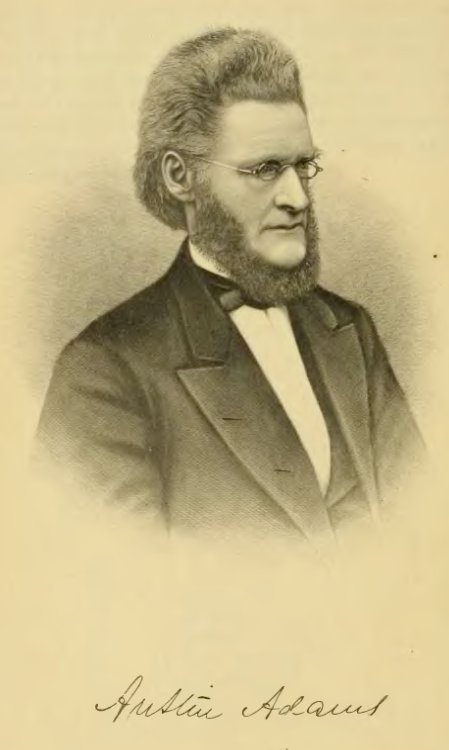History of Iowa From the Earliest Times to the Beginning of the Twentieth Century/4/Austin Adams
AUSTIN ADAMS was born at Andover, Vermont, May 24, 1826. He worked on his father's farm until fourteen years of age, attending the district school during the winter months. He prepared for college at Black River Academy, teaching school winters from the time he was sixteen, to assist in defraying expenses through college. Entering Dartmouth he graduated in 1848. While pursuing his legal studies he served five years as principal of West Randolph Academy. In 1853 he attended Harvard Law School and the following year was admitted to the bar, entering into partnership with Ex-Governor Coolidge. Mr. Adams soon removed to the far West, becoming a resident of Dubuque, Iowa, in July, 1854. There he began the practice of law, also took an active part in promoting public education, assisting at Teachers' Institutes. He was a prominent speaker in the first Republican campaign in Iowa. In one of his addresses he said:
“If the day has come that John C. Fremont or any other man in the country cannot be elected President without that election destroying the Government, then we have no republican government.”
In 1855 and in 1861 he delivered courses of lectures to raise funds for the establishment of a public library. Attending the famous discussion in 1858 between Abraham Lincoln and Stephen A. Douglas at Galena, Judge Adams remarked of Mr. Lincoln:
“I have heard the greatest man I ever listened to; he ought to be our next President.”
In 1875 Mr. Adams was elected judge of the Supreme Court and became Chief Justice in 1880. At the close of his first term he was reëlected, serving a period of twelve years, again becoming Chief Justice in 1886. He took a deep interest in the State University and was one of the Regents for sixteen years. He was also a Law Lecturer in the institution from 1875, as long as he lived. The students of the Law School spoke of Judge Adams as the intensely practical lawyer who taught largely by illustration. He was the sympathetic friend of young people. In 1883 Dartmouth College conferred upon him the degree of LL. D. In 1886, as Chief Justice, he presided over the opening of the new Supreme Court rooms in the recently completed State House. Judge Adams was an earnest advocate of the study of law for women and always welcomed them to the lecture room at the State University. He was the first Chief Justice to admit a woman to practice in the Supreme Court of Iowa and spoke in the highest terms of the manner in which she tried a case at the time she was admitted. Judge Adams retired from the bench at the close of his second term, and died in Dubuque on the 17th of October, 1890.
